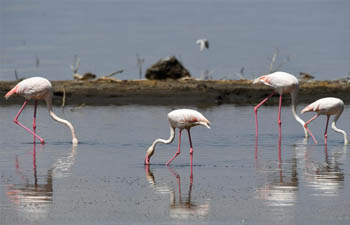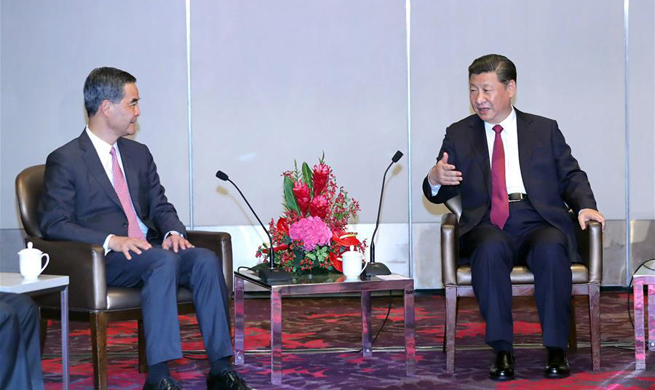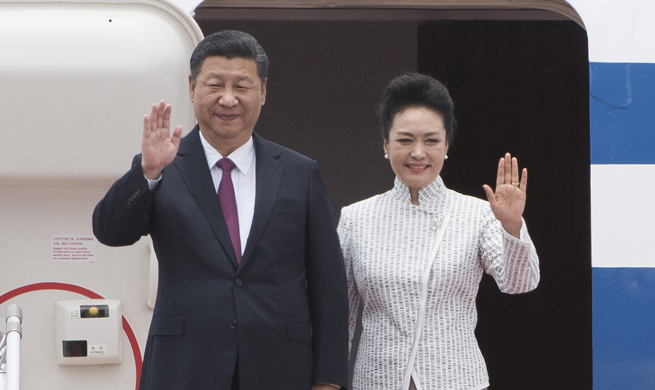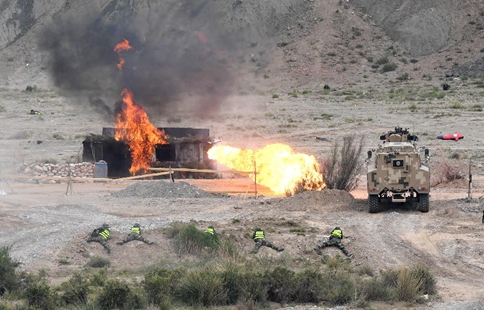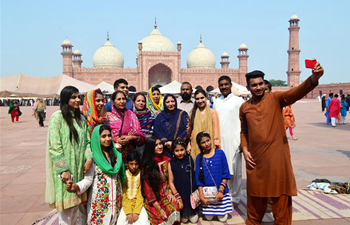ANKARA, June 29 (Xinhua) -- Turkey and Germany are on the brink of a new diplomatic crisis ahead of Turkish President Recep Tayyip Erdogan's visit to Hamburg for G20 summit on July 7-8.
New tensions are rising between the two NATO allies, whose ties were already strained, as Erdogan wants to hold a political rally in Germany on the sidelines of the G20 summit. German authorities have rejected the idea, citing it is "not the right time".
Erdogan officially requested permission on Wednesday to address Turks in Germany, but German Foreign Minister Sigmar Gabriel said on Thursday that it would be "inappropriate" for the Turkish president to hold a rally on the sidelines of the G20 summit, given current tensions between the two nations.
Gabriel said his government did not want Turkish citizens and people holding dual citizenships living in Germany to be riled up.
Gabriel's remarks came after a call by the leader of Germany's Social Democrats (SPD) Martin Schulz for banning Erdogan from holding a rally in his country.
"Foreign politicians, who trample on our values at home, must not be allowed a stage for speeches in Germany. I don't want Mr. Erdogan, who jails opposition politicians and journalists in Turkey, to hold large-scale events in Germany," Schulz, German Chancellor Merkel's rival in presidential elections, told daily Bild on Wednesday.
In swift response to German politicians' statements, Turkish Foreign Ministry said their remarks were made upon domestic policy considerations and were "regrettable".
In the context of Erdogan's visit to Hamburg, "it is regrettable that the German authorities are demanding official application for a meeting of citizens for their own regulation, on the other hand, some German politicians in Germany are making unacceptable statements based on domestic policy accounts," Huseyin Muftuoglu, Turkish Foreign Ministry's spokesman, said in a written statement on Thursday.
"Especially the approach of a person, who held the Presidency of the European Parliament, to restrict the freedom of assembly and freedom of expression once again reveals the real face of the mentality we face and the double standard...", said the spokesperson, referring to Schulz.
Meanwhile, Turkish media quoted Turkish presidential sources saying that there is no rally scheduled yet on Erdogan's visit to Germany.
No official application to the German authorities had been made, unlike what Gabriel had claimed, but the application may have been made by certain Turkish NGOs, the Hurriyet Daily News quoted anonymous Presidential sources as saying.
Meanwhile, a number of venues located in the North Rhine-Westphalia region have refused to host Erdogan, according to German media reports.
The German government also demanded the Turkish president not include in his security team the security bodyguards who face arrest warrants in the U.S. for attacking protesters in Washington during Erdogan's visit to the country on May 16.
Erdogan made his last appearance before supporters in Germany in May 2015. Since then he has not been able to hold political rallies, which aim to reach roughly 4 million Turkish citizens residing in Germany, largely because ties between two NATO allies have gone from bad to worse over the last couple of years.
In early March, German authorities banned a number of rallies in support of an April 16 referendum which sought to expand Erdogan's presidential powers.
In retaliation, Erdogan lashed out at German politicians and compared their policy to "Nazi measures", sparking outrage in Germany, where the country's Nazi past remains highly sensitive.
Erdogan's planned rally in Germany is just one of the latest political moves that will escalate tensions between the two nations.
In February, Turkey arrested a Turkish-German Die Welt reporter Deniz Yücel on charges of inciting hatred and terrorist propaganda.
Germany has accepted asylum claims from high-ranking Turkish generals in NATO. While Turkey claims that these soldiers are linked to a failed coup attempt in July 2016, Germany granted asylum to Turkish officers for fear that they would not receive a fair trial in Turkey.
Turkey has subsequently denied members of Germany's parliamentarians' access to German soldiers based at a military facility in Incirlik airbase which are deployed as part of anti-Islamic State coalition forces.
The refusal prompted German parliament to decide to move their military installations from the key Incirlik airbase in Turkey.






